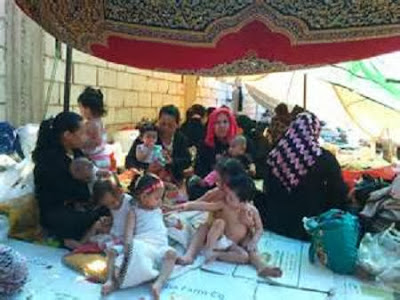OFWs exposed to abuses in the Middle East
 |
| Stranded Filipino domestic helpers in Saudi Arabia. |
Recently, the Saudi government has threatened to arrest foreign workers who are working without the necessary working permits from the Saudi government. But how did it come to this point? This question is even made more complicated at the way foreign workers, especially domestic helpers, are treated at the work places, where most of them had experienced cultural shocks and physical abuses by their employers. Hence, some of them were left without any choice but to run away.
And there are instances when their problems were made even more serious when they encounter inept and maniacal embassy officials who ignored the pleas of these hapless Filipino female workers. Instead of helping them, they even try to cajole them into going back to their abusive employers, which many labor analysts interpret, as a means to make the work of embassy officials much easier.
A few days ago, the Senate of the Philippines conducted another public hearing to uncover more details that would pave the way for the slapping of criminal charges against ranking labor officials who may have a hand in neglecting their duties to lend assistance to the distressed female workers. But instead of helping them, some of these labor officials had taken advantaged on the weaknesses of these domestic helpers, even after one of them was already raped by her Yemeni employer.
Consequently, these sad tales of female Filipino workers led to the recall of the labor attaches in Saudi Arabia and Kuwait back to the Department of Labor and Employment central office in Manila, while the criminal cases against some of them are being prepared by the authorities. In the aftermath of the recall, female labor officials were instead sent to replace them. This move was hailed by cause-oriented organizations as the most practical way to address the needs of distressed female workers in the Middle East.
As per my observations and based on sociological studies, too, foreign domestic workers deployed to work at the various homes in Saudi Arabia and elsewhere in the Middle East, were not prepared to immerse themselves in such a work environment due to some personal or work-related constraints. Among them were, perhaps, they are made to sign another contract in Arabic language which they couldn't understand completely, even as they had originally signed a contract with the manpower agency that hired them in Manila, showing a much higher salary. In the second contract, what's reflected is a much lower monthly salary than what was previously agreed upon. This is not to mention the cultural shock that each female worker experienced in a Saudi employer's household.
In other countries, domestic helpers are normally given a separate room that is separated from the main house, where they are free to do whatever they want to do after working, say 12 hours of continuous duty. But this is seldom observed in Saudi Arabia and other Gulf countries. Knowing the erratic state of minds by some male members of the immediate family, female domestic helpers could be exposed to physical abuses and rape by husbands or sons of their employers, especially when the wives are not around.
Even at this writing, complaints of rape cases gains foreign domestic helpers are filing up in most foreign embassies in the Middle East. But embassy officials seemed reluctant to exhaust all means to extend a helping hand for reasons unknown to the public.
In view of these, many Filipino taxpayers are wondering why this is happening to overseas Filipino workers (OFWs) in the Middle East? Without a line government department whose main task is to address the plights of the OFWs, labor-related problems abroad are expected to haunt the Department of Labor and Employment (DOLE) and the Department of Foreign Affairs (DFA). This is, perhaps, the reason why Senator Cynthia Villar, wife of former Senator Manuel Villar, is working on a bill that will, once and for all, create the Department of Overseas Filipino Workers.
In a broadcast interview with ANC's Beyond Politics, Senator Villar said it is now the time to have a separate department to address the needs and woes of some 12 million OFWs worldwide. Currently, the office that is handling the affairs of the OFWs happens to be the Overseas Workers Welfare Administration (OWWA), an attached agency of DOLE.


Comments